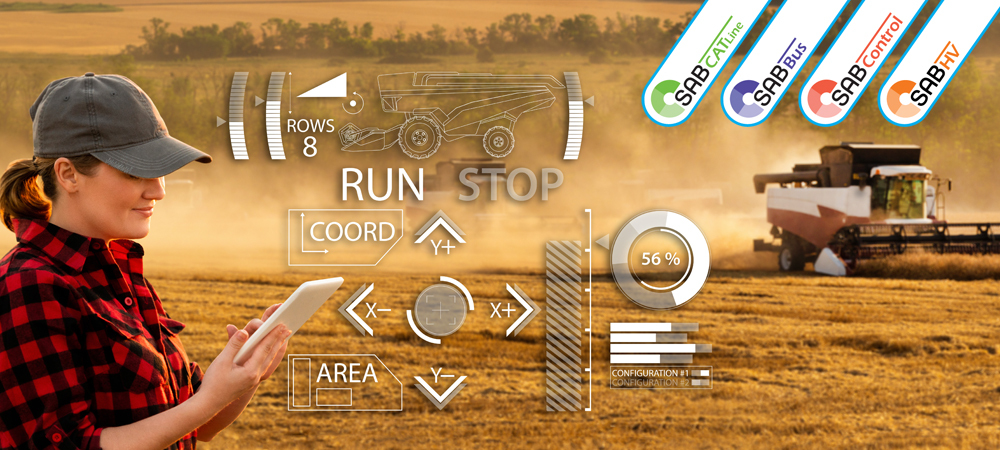
Fully autonomous vehicles are not common on highways, but many of their underlying technologies are already changing driving habits. At the same time, their innovations are transforming logistics across industrial and agricultural landscapes. Whether they are on the road or on the job site, their independence will be impossible without fast, secure data exchange and strong connectivity. This blog post will provide an overview of the growing adoption of autonomous vehicles as well as the wires and cables that are helping them revolutionize transportation.
Self-driving vehicle applications
Autonomous vehicle technology is rapidly gaining widespread adoption in these sectors:
Passenger cars. Technologies such as GPS, artificial intelligence (AI), light detection and radar (LiDAR), cameras, and various types of sensors allow autonomous vehicles to navigate roads, avoid hazards, exchange data with the electronic control unit (ECU), and communicate with others. Vehicles. The Society of Automotive Engineers (SAE) rates vehicle autonomy on a scale from Level 0 to Level 5. Most passenger cars are Level 2 and offer driver assistance features such as adaptive cruise control, blind spot detection and safety systems. Level 5 vehicles are fully automated. Industrial and construction. Automated Guided Vehicles (AGVs) and Automated Mobile Robots (AMRs) effectively improve productivity and efficiency while reducing labor requirements in manufacturing, warehouse and construction environments. AMRs do not follow a fixed path and are particularly adept at learning store and warehouse floor layouts and navigating around obstacles. Cameras, infrared (IR) sensors, gyroscopes and accelerometers navigate the ground, and mapping software helps the AGVs remember the layout of the new site. agriculture. On farms, autonomous tractors can now perform seeding, weeding, plowing and harvesting tasks. Autonomous vehicles are invaluable for collecting data that helps farmers analyze crops, weather conditions, or nitrogen levels in the soil so they can plant more strategically. Tractors communicate with other agricultural systems and equipment via the ISO 11783-2 (ISOBUS) communication standard.
Wires and cables for autonomous vehicle technology
With all of these advances, autonomous and self-driving vehicles require higher bandwidths to transfer data efficiently across networks and with other vehicles as well as high-voltage electronics to provide greater functionality. The cables at the heart of these systems must support these high voltage and data requirements, withstand harsh conditions and withstand rigorous testing to meet various regulatory requirements. Here’s how SAB can help:
Bus and Ethernet cables. SAB Bus and SAB CATLine flexible cables support ISOBUS, PROFIBUS and CANbus protocols, as well as CAT 5, CAT 6A, CAT 7A and SPE Ethernet communications. These gigabit data cables provide greater bandwidths and speeds to enable more device and sensor connections. They also feature exceptional signal integrity, sturdy construction and are available in hybrid and halogen-free versions. Control and connection cables. SAB control cables combine power and data in a single cable and are well suited for use with motors, drives and automated equipment. High voltage cables. Our high voltage line of high voltage cables provide reliable and safe electrical transmission as well as withstand mechanical stresses typically found in hybrid and electric vehicles. For example, HV 1000 C patch cables are rated to 1000 VAC and combine rugged construction with flexibility for exceptional routing and smaller bending radii in agricultural, construction and specialty vehicles. We recently highlighted the HV series in a previous post. ETFE, FEP and PFA branches. Boasting exceptional insulating properties and having a wide stable temperature range, our chemical and solvent resistant cable strands are ideal for tractor electronics and lighting equipment. Special and hybrid cables. At SAB, we can create a custom cable, hybrid design or supply a special material and turn it around quickly.
Our flexible cables resist oils, chemicals and other harsh environmental conditions, making them well-suited for harsh applications typically found in the automotive and agricultural industries. In fact, they are available in a variety of jackets, connectors and insulators to handle a wide range of conditions.
Enhance safety, productivity and efficiency
With SAB cables, you can be sure that critical data will be transmitted accurately and reliably, so passengers and cargo arrive safely and autonomous industrial and agricultural vehicles increase the productivity and efficiency of your operations.
For more information, please visit www.sabcable.com.



